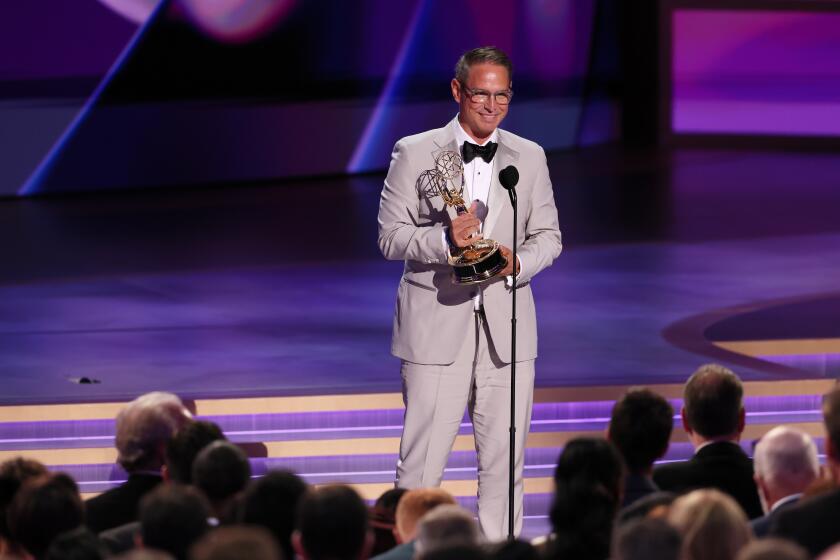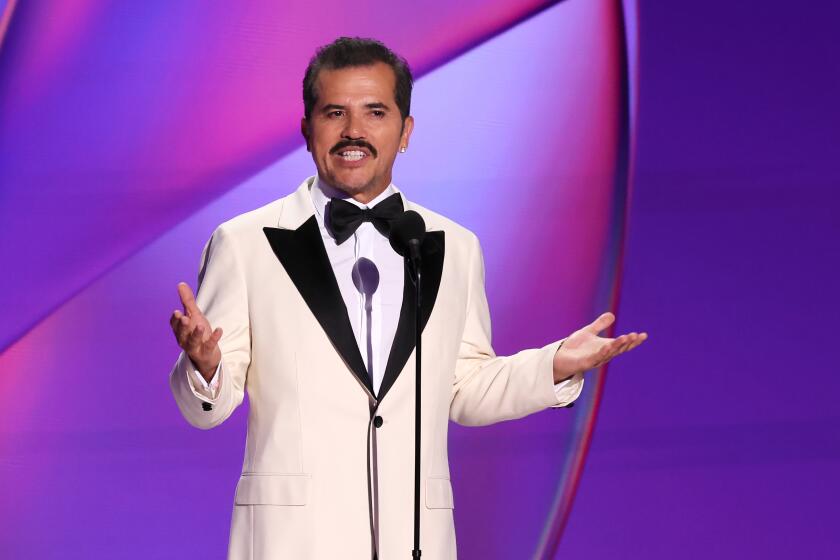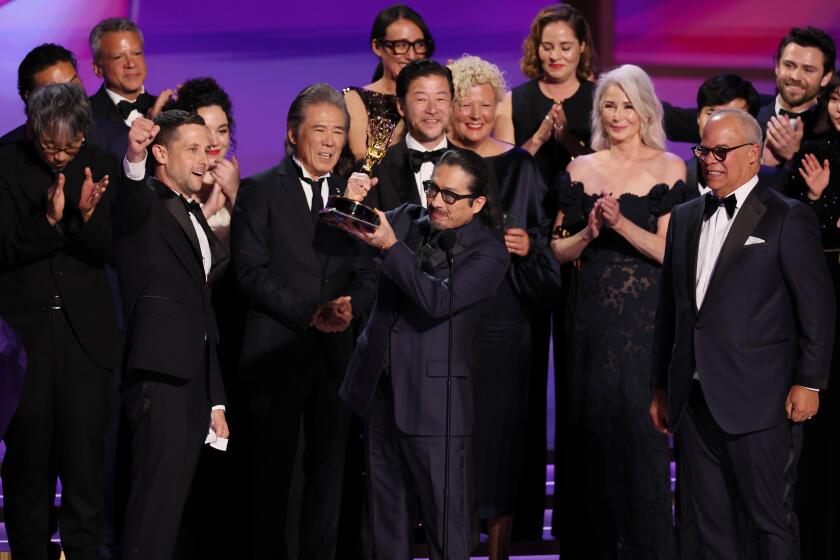The Emmys That Might Have Been
Don Mischer, who for the last several weeks has been twisting in the political winds swirling around the 53rd annual Emmy Awards, won’t be around to produce the telecast--whenever, wherever and however it takes place.
In the end, it was a truly symbolic event that led Mischer to pull out. Instead, he’ll be producing the opening ceremonies of the 2002 Winter Olympic Games, in Salt Lake City, where the nations of the world will gather at an Olympics for the first time since America declared war on terrorism. Mischer is under an exclusive commitment to the U.S. Olympic Committee.
On Thursday, as the Academy of Television Arts & Sciences’ executive committee met to discuss Emmy options (including holding an A-list USO show at a Southern California military base), Mischer said he would remain as a consultant, to “help in any way I can.” But the Olympics opening ceremonies, he added, “are important for us and the world.”
An announcement on the revamped Emmys is expected within days. “We’re trying to put it back together again,” CBS Television President Leslie Moonves said Thursday at a New York breakfast with a handful of reporters. “There’s a lot of support for it and a lot of support against it. You have to wade through who is sincere and who has an ulterior motive.”
Even with his departure, Mischer is hoping that CBS and the academy retain some of the segments produced for the rescheduled Oct. 7 Emmys, which were postponed just hours before air time.
Those segments, he felt, did more than create a telecast paying lip service to Sept. 11. In fact, Mischer had moved the show away from its high-school-with-money aspects, perhaps creating the best Emmy broadcast no one will ever see.
“I was operating at kind of a disadvantage because in my head I knew that the tone and feel of this show would be different, and that if people knew how I was envisioning this thing, they would be OK about coming,” he said of a celebrity community that was torn about showing up.
In an interview earlier this week at CBS Television City, where he is also executive-producing the ABC comedy-variety series “The Wayne Brady Show,” Mischer outlined some of the segments he had prepared to make this year’s Emmy telecast, his eighth, a moving and even cathartic experience.
They include five video tributes to, among others, New York City fire and police rescue teams, brief documentaries produced and directed by June Beallor, the Academy Award-winning producer of the 1998 documentary of the Holocaust, “The Last Days.”
Emmy nominees including Sela Ward, Emma Thompson and John Spencer taped segments quoting from John F. Kennedy, Oliver Wendell Holmes and the Rev. Martin Luther King Jr.
Having combed the New York City school system for a teenager to sing “America the Beautiful,” Mischer’s team wound up getting Daniel Rodriguez, a New York City cop and part-time opera singer, to do the honors. He came recommended by an attorney for Mayor Rudolph Giuliani, who was to have closed the show with some words from a New York studio.
That’s not to say the telecast would have been entirely devoid of humor; Jon Stewart, host of Comedy Central’s Emmy-nominated “The Daily Show,” had put together a spoof of reality series in which three Hollywood producers are locked in a room and not allowed out until they came up with better concepts than “Big Brother” and “Temptation Island.” That sketch aired on Thursday night’s edition of Stewart’s “Daily Show.”
For Mischer, the second postponement of the broadcast was less a shock than a relief, given that America was heading into war and celebrities were hesitant to show up. It was the trophy girl who broke the news to him backstage, telling the producer that her mother had heard NBC News anchor Tom Brokaw announce that the Emmys were canceled.
This was a fitting culmination to a strange three weeks in Mischer’s long producing life, during which he became a conduit for a lively debate within Hollywood.
In the days after Sept. 11, he spoke to a shaken Stewart, whose apartment is not far from where the World Trade Center towers once stood. “I heard the plane fly over my apartment,” Stewart told Mischer.
A British talent agent had a different view. “You know, you Americans just don’t get it,” Mischer says the agent told him. “It’s because you’ve never confronted this kind of thing in your homeland before. But if this were Britain, those Emmys would have gone on that Sunday night.”
A female nominee told Mischer that she wouldn’t show up if there was a red carpet. The producer of a nominated series called to say that if there were acceptance speeches, he and his writers would boycott the ceremony.
Another nominee told Mischer: “The fourth or fifth time someone holds up an Emmy and says, ‘I dedicate this to the firefighters in New York,’ I’m going to throw up.”
Mischer said he spoke half a dozen times with John Wells, the executive producer of three series, including the NBC White House drama “The West Wing,” which was expected to square off for Emmy supremacy with HBO’s Mafia drama “The Sopranos.”
Getting “The West Wing” to attend seemed important, as if a White House endorsement--even a fictional White House endorsement--would prompt others to attend.
On Oct. 1, Mischer had a conference call with Wells, series creator Aaron Sorkin, Thomas Schlamme, the show’s director/executive producer, and the cast (except for Martin Sheen, who plays President Josiah Bartlet, who spoke with Mischer separately).
“I think ‘West Wing’ felt uncertain about attending the Emmys if ‘The Sopranos’ cast was not attending the Emmys,” said Mischer, who was also in regular contact with Brad Grey, an executive producer on “The Sopranos.” “Had they attended without the ‘Sopranos’ cast attending, and had they won, they didn’t feel that was right, since they were competing with ‘The Sopranos’ and that was one of the major races. I think they wanted to know that that team was going to be there as well. That’s just a theory of mine.”
Mischer says the cast wanted to know what the show would look like and how it would feel. He understood their insecurities. It was not unlike the way the Olympic Games has a way of filling a host city with feelings of dread and inadequacy. “Nothing makes a city more insecure about itself than being the host of the Games,” said Mischer. “Atlanta [host of the 1996 Summer Games] was unbelievably insecure. The previous Olympics had been in Barcelona. They had art; they had architecture; they had music; they had an incredible history.”
By the same token, how could an awards show possibly compare to the crisis gripping the nation? This was evidently a concern at “The West Wing,” as for other nominees. The unusual circumstances led Mischer to break one of his cardinal rules as a producer: He told people what he would be doing on the show, giving away secrets to ease their doubts.
“The element of surprise is so important,” Mischer said. “Had we not had to talk about it, to start these Emmys off with, ‘Ladies and gentleman, Walter Cronkite,’ you really would have heard a response. But we were dealing with a community that had only one image of the Emmy Awards, and that was the glitz, the glamour, the silliness and all that they’ve always been.”
*
Times staff writer Elizabeth Jensen in New York contributed to this story.
More to Read
The complete guide to home viewing
Get Screen Gab for everything about the TV shows and streaming movies everyone’s talking about.
You may occasionally receive promotional content from the Los Angeles Times.






